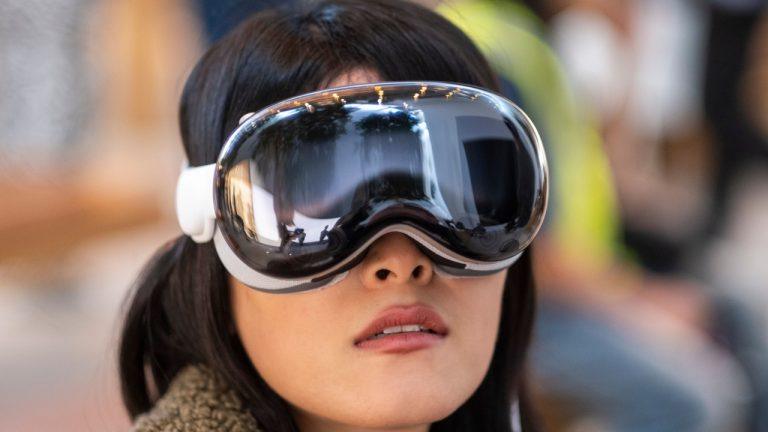 In a recent social media post, Justin Sun, the crypto entrepreneur, shared his experience with the HTX app on his Apple Vision Pro. He expressed his satisfaction with the app’s performance, highlighting its capabilities to view cryptocurrency and place orders. Sun’s post also revealed that HTX is in the process of developing a new concept […]
In a recent social media post, Justin Sun, the crypto entrepreneur, shared his experience with the HTX app on his Apple Vision Pro. He expressed his satisfaction with the app’s performance, highlighting its capabilities to view cryptocurrency and place orders. Sun’s post also revealed that HTX is in the process of developing a new concept […]
An under-the-radar virtual reality metaverse altcoin teased an upcoming app release on the new Apple Vision Pro headset and surged by more than 24% in a matter of hours on Friday. Victoria VR (VR) is a blockchain-based virtual reality metaverse powered by the 3D creation tool Unreal Engine. The massively multiplayer online role-playing game (MMORPG) […]
The post Virtual Reality Metaverse Altcoin Soars Over 24% in a Day As the Crypto Project Teases New Apple Vision Pro App appeared first on The Daily Hodl.

KPMG's Head of Metaverse Alyse Sue believes the tech included in Apple’s mixed reality headset could shift the way users interact and experience the metaverse.
The release of Apple’s new mixed-reality headset, Vision Pro, could cause a seismic shift in how users will experience the metaverse, with developers potentially moving away from the absolute isolation of virtual reality.
Unlike today's virtual reality headsets, which center on full immersion, Apple’s Vision Pro — unveiled on June 5 — can also superimpose applications onto the real world, letting users "interact with digital content in a way that feels like it is physically present in their space.”
Apple's AR headset revealed - Apple Vision Pro pic.twitter.com/UpNM7cH5yL
— Wario64 (@Wario64) June 5, 2023
Speaking to Cointelegraph, KPMG’s Head of Metaverse Alyse Su believes the Vision Pro will shift developer focus away from purely immersive virtual worlds.
The headset introduces a new technology it calls "EyeSight," which uses lens trickery to make the user’s facial expressions look natural to outsiders. EyeSight also allows the display to switch between a transparent and opaque view, depending on whether a user is consuming immersive content or interacting with people in the real world.
“With the traditional or other headsets, there's this barrier between people who are wearing it and people who aren't. It feels like you're in two different worlds,” she said. “Now there's very few barriers between people, so you can have relatively seamless interactions.”
Apple EyeSight lets people see your eyes when you're using the headset pic.twitter.com/p773ZPjwRZ
— Dexerto (@Dexerto) June 5, 2023
Su said there is also a lot of potential in its eye-tracking technology, which can be used to help create personalized experiences.
Apple’s pupil-tracking technology works by detecting the mental state of users based on data from their eye movements and the response of their pupils to stimulus. It then uses artificial intelligence to make predictions about their emotions.
I spent 10% of my life contributing to the development of the #VisionPro while I worked at Apple as a Neurotechnology Prototyping Researcher in the Technology Development Group. It’s the longest I’ve ever worked on a single effort. I’m proud and relieved that it’s finally… pic.twitter.com/vCdlmiZ5Vm
— Sterling Crispin ️ (@sterlingcrispin) June 5, 2023
“They've incorporated a lot of neuroscience or neuro tech research into this headset. The most overlooked part is the predictive pupil dilation tracking technology, which is based on their years of neurological research,” said Su.
Su predicted that the Vision Pro will steer developers towards utilizing “emerging fields such as neuroscience and generative AI to create more personalized and predictive experiences.”
Peter Xing, the founder of blockchain-based project Transhuman Coin also praised the headset’s design for “integrating with the natural way we interact as humans” and pointed to its unique eye-tracking capabilities as one of the bigger leaps forward for the metaverse.
“By detecting pupil dilations, the headset is acting as a proto-brain-computer interface to pick up when a user expects something to be selected to pre-empt what they’re thinking.”
Related: Animoca still bullish on blockchain games, awaits license for metaverse fund
When asked if the Vision Pro could put a spring back into the step of a struggling metaverse industry — which has seen almost all of the blockchain-based virtual worlds suffer losses of more than 90% in their native tokens — Xing wasn’t overly hopeful, at least not in the short-term.
He explained that it’s highly unlikely that Apple would encourage decentralized approaches that could threaten its “lucrative walled garden.”
While he, and many others, noted the distinct lack of a gaming focus in the product release, Xing believes the recent Apple’s partnership between Disney and Marvel could see a wellspring of games and other interactive experiences brought into the fold.
Xing believes this is exactly what the metaverse needs to go from the “gamer-centric world” to the mainstream.
AI Eye: AI travel booking hilariously bad, 3 weird uses for ChatGPT, crypto plugins

The tech giant finally dropped details of its new pricey mixed-reality headset during the Worldwide Developers Conference, though it made no mention of the word “metaverse.”
Apple’s newly revealed mixed-reality headset, the Apple Vision Pro, has both turned tech-enthusiast heads and raised eyebrows after its unveiling at the WWDC on June 5.
There was however, one glaring omission from the launch — a single mention of the word “metaverse.”
Apple Vision Pro is everything we hoped for and then some.
— Bilawal Sidhu (@bilawalsidhu) June 5, 2023
But at $3,499 you're either an early adopter or a AR/VR developer.
Yet two things change after today:
1. "Metaverse" will stop being a bad word (even though Apple didn't use the word) - sparking a resurgence in… pic.twitter.com/x8FcGsKTbj
The tech company appears to have taken deliberate steps to call its technology the first “spatial computer.” It will be launched in the U.S. in early 2024, for a hefty retail price of $3,499, and will roll out to other countries shortly after.
The announcement is a firm step away from Microsoft’s Hololens launches and that of Meta’s headsets, which both notably used the term generously in comparison.

Instead, Apple’s marketing is focused on the words “spatial” and “spatial computing,” as opposed to words such as “metaverse,” “AR” and "VR.”
“Creating our first spatial computer required invention across nearly every facet of the system,” noted Apple’s vice president of the technology development group, Mike Rockwell.
“Through a tight integration of hardware and software, we designed a standalone spatial computer in a compact wearable form factor that is the most advanced personal electronics device ever,” he said.

Back in January 2022, Bloomberg’s Apple tech reporter, Mark Gurman, suggested via Twitter that the firm had no intention of approaching the sector in a similar vein to Mark Zuckerberg’s Meta, particularly relating to the notion of the metaverse.
“I’ve been told pretty directly that the idea of a completely virtual world where users can escape to — like the can in Meta Platforms/Facebook’s vision of the future — is off-limits from Apple,” Gurman said, adding that the firm will place its focus providing a mixed-reality headset intended for use in short bursts for work, gaming, communication, etc.
Apple’s Vision Pro has both augmented reality and virtual reality capabilities, as it can make it look like apps have been projected out into the nearby physical space around the user or provide a fully virtual experience via modes such as Immersive Environments.
“Featuring visionOS, the world’s first spatial operating system, Vision Pro lets users interact with digital content in a way that feels like it is physically present in their space,” the announcement reads.
Related: Tim Cook says Apple will weave AI into products as researchers work on solving bias
Anticipation over Apple’s new headset had some investors hoping metaverse-related tokens would see a meteoric rise; however, a new Securities and Exchange Commissionlawsuit on the same day appears to have spoiled optimism for metaverse-related tokens.
According to CoinGecko, the top-ranked metaverse token Internet Computer (ICP) is down 9.5% over the past 24 hours, while second and third-placed The Sandbox (SAND) and Decentraland (MANA) are also down 12.7% and 11.2% apiece.

Going further down the list, there are no projects of note with positive price action over that time frame, with the total market cap for metaverse tokens decreasing by 10% to $7.7 billion over the past 24 hours.
Magazine: Web3 Gamer: Illuvium controversy, Aurory Prologue review, Fornite CEO salty, Assassin’s Creed NFTs